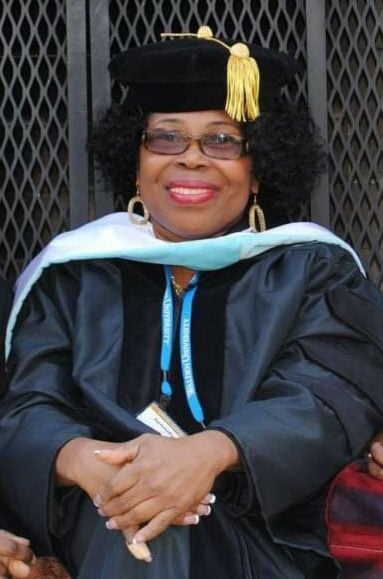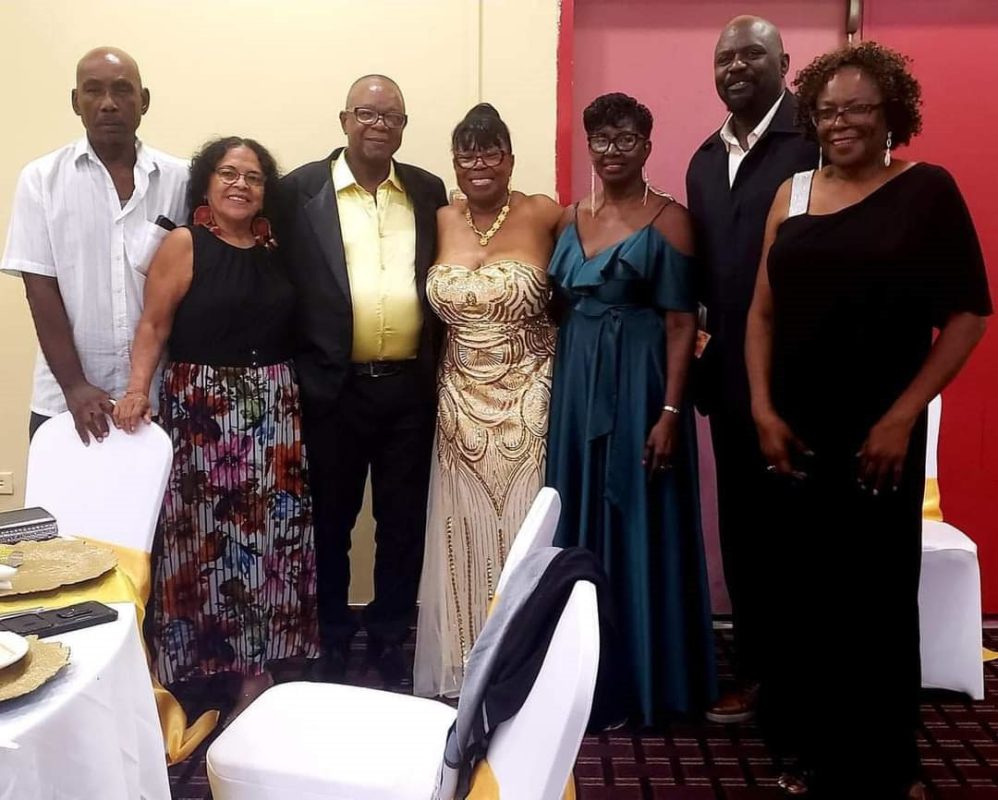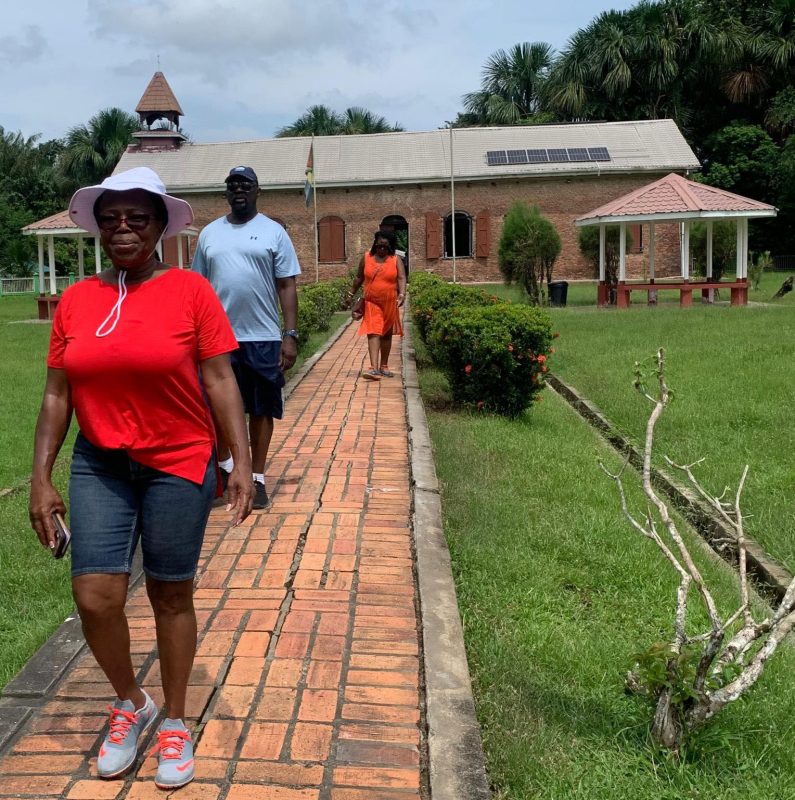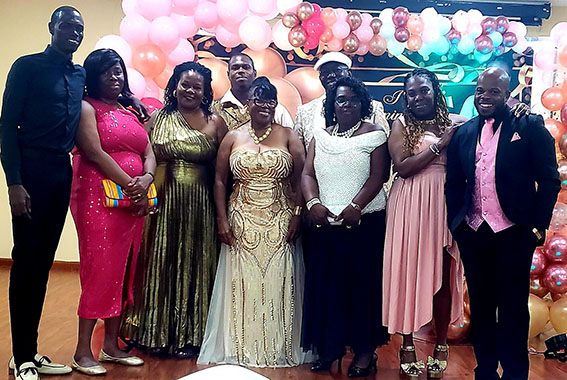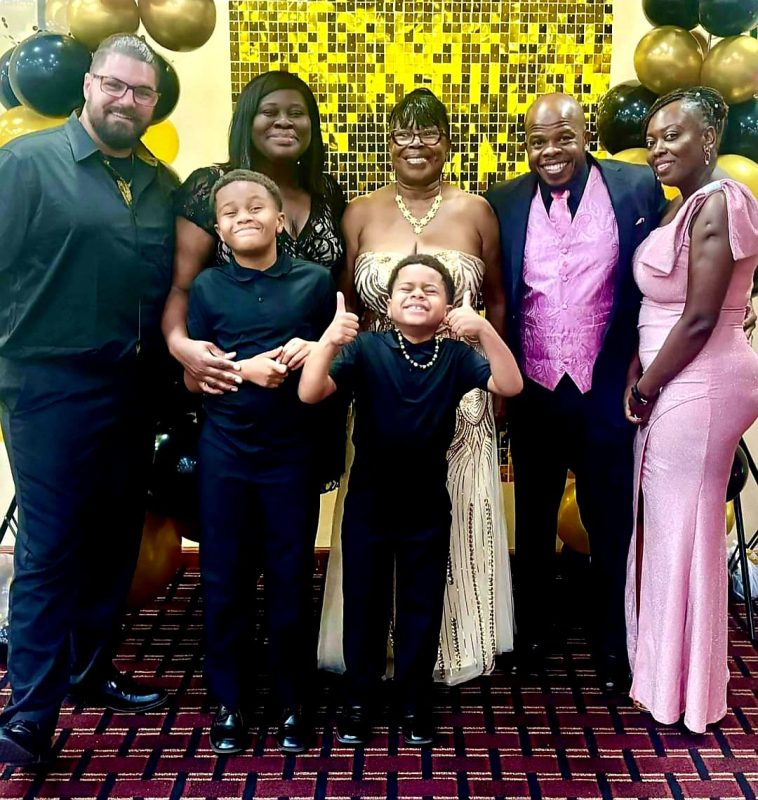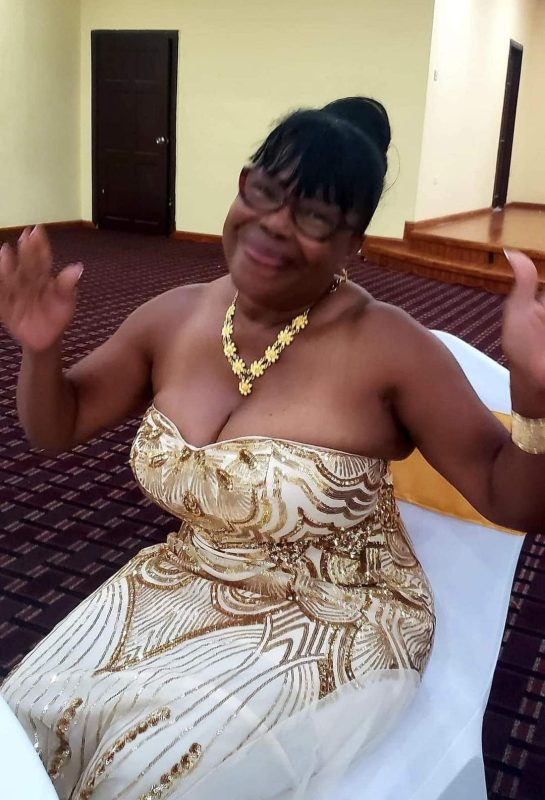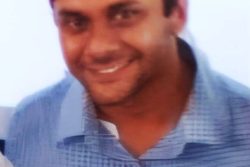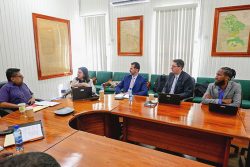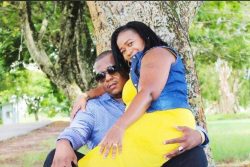US-based Guyanese Dr Jennifer Joseph nee Prince, who just celebrated her 65th birthday in style with family members and friends in Guyana, had never planned on becoming a Maths teacher or a Maths specialist, rather she saw herself in the field of linguistics.
“When I went to the then Lilian Dewar College of Education, where teachers for the secondary system were tutored during the late 70s/early 80s, I went to do Spanish and English. Ms Mavis Pollard, then principal pulled me aside and asked me why don’t I do Math. She said I was the only student at the college with a distinction in Math and there was a dire need for Math teachers. I never liked Math but somehow, I was always topping the class in Math. I decided to major in Math and English. That was modern Math which was a challenge to me, but I told myself, ‘I’m not a quitter. I’m going to do it until I get it right’,” Joseph recalled to Stabroek Weekend.
Mathematics was the only subject she gained a distinction in at the General Certificate of Education Ordinary Levels examinations in 1975.
“For the life of me, I don’t know how that happened. I loved geometry but the rest of Math was just not my cup of tea. Mr Skeete, my math teacher, used to pull out a whip and frighten the heavens out of me,” she recalled.
Today she is an assistant professor at Bronx Community College, one of the colleges of the City University of New York (CUNY) system. She had taught mathematics at Theodore Roosevelt High School in the Bronx, New York City for 21 years, and retired last year.
Joseph, who was among the second batch of students to enter the then North Government Secondary School in 1970, was born in Liliendaal where she lived until she was ten years old. She attended the then St Mary’s Lutheran now known as Bel Air Primary where she wrote the common entrance examination. The family lived briefly in Seaforth Street, Campbellville then moved to Festival City when the housing scheme opened in 1972.
After leaving secondary school she worked for a year at the Ministry of Housing which was then across the road in Kingston where Lilian Dewar College of Education was located. “We could see the students in their uniforms,” she recalled.
Her uncle who was then the chief test development officer in the Ministry of Education encouraged her to apply for entry to the teachers’ training college and so she did. She successfully completed the three-year secondary programme from 1976 to 1979 then taught at Alleyne’s High on Regent Street. While there, she also pursued a bachelor’s in education majoring in mathematics with a minor in English at the University of Guyana (UG). “Many people told me I should have done it the other way around,” she recalled.
“It was hard. I was teaching at Alleyne’s High School and going to UG in the afternoons and during my spare time, studying and the rest of it. I had one child then two. I got both while I was on campus. I had problems in my personal life. I got married at a young age. My husband was an army officer stationed at Eteringbang and he was never at home. It was rough on me. I was living in Festival City, and I walked to and from UG many times because I had no money. My daughter was born in 1987, and she was a sickly baby. Every other morning, I had to take her to the hospital. I spent a long time completing my first degree at UG. I dropped out and I returned several times until I graduated in 1988 after many starts and stops.”
On the islands
After graduating from UG, Joseph moved to the Linden-Soesdyke Highway and taught at Soesdyke Community High School then at Dora Secondary, which was the last school she taught at in Guyana before she went to St Lucia in 1992 with 13 years experience in teaching.
While she enjoyed her teaching career in Guyana, Joseph said, the salary was meagre and most of her teaching colleagues were migrating to the Caribbean islands because of the economic conditions at home.
“I left the year when there was a change in government. My friend Sherry, who was in St Lucia, was doing well. She came home and she encouraged me to move on. She said, ‘Jennifer you can work for so much money and you can do so much more for your family.’ I was living at Kuru Kuru on the highway, and I was struggling on a teacher’s salary. My marriage was also on the rocks. That and other reasons was how I ended up in St Lucia,” she recounted.
She also related that the principal at the school where she worked would collect the teachers’ salaries on payday and then not be seen until two or three days later. “He would collect the payroll and when he brought it back there would be a couple dollar missing here and there. I left Guyana, principally because of the economic conditions and I wanted to see an improvement in my life and for that of my children,” she said.
Joseph spent five years in St Lucia. In 1997 she went to Jamaica where she spent a year.
“Jamaica was nice. However, I was teaching in a small village in Clarendon that was more or less isolated from the rest of the island. I felt limited and hemmed in even though the people were wonderful. As a teacher everyone’s eyes were on me. I couldn’t even go to a bar and relax. I was seen as an exemplar and living that exemplary life was stifling,” she said.
From there, she went to the Bahamas where she remained until 2000, when she returned to St Lucia and emigrated to the USA in 2002.
The working conditions in St Lucia, she said, were okay, but she felt like she had hit the glass ceiling. “You work for your money and at the end of the day you go home. There was no room for educational expansion,” she stated.
Her daughter Candice was always with her. Her son Kerry was with her in Jamaica where he finished high school. The children moved with her to the Bahamas and in 2000 when she went back to St Lucia, Kerry returned to Guyana to attend the University of Guyana. Joseph explained that in St Lucia there were limited things for students to do academically after high school. They had to leave the island to pursue a university education.
“Sir Arthur Lewis College, where I taught in St Lucia, only takes a student to an associate degree. So, when I got the opportunity to migrate to the USA, I took it mainly for the children. After Kerry had completed his bachelor’s degree he needed further education. My daughter was also graduating from high school, and I took the opportunity to go up to North America,” she explained.
Joseph was among the teachers the New York Board of Education recruited from St Lucia and other parts of the Caribbean during the early 2000s.
During the time she was in St Lucia, she started a master’s degree in mathematics with Sheffield Hallam University in the United Kingdom. “It was mainly online, but I had to travel to the UK to write exams. I didn’t complete it. I did a post graduate certificate in statistics. By that time, I had the opportunity to go up to the US and I took it,” she added.
In the Bronx
In the USA, while she taught, she continued to study to obtain a master’s degree.
“However, I did a pivot on what my master’s was going to be in. By that time the amount of English language learners who were coming into the US was the focus. I did a master’s in teaching English as a second language. My dissertation was teaching Math to language learners. I was certified to teach Math in the US. So, I focused on teaching Math to English language learners to Spanish children and others coming to New York City from overseas,” she explained.
She obtained her master’s degree from Lehman College, CUNY in 2005.
“When I got to New York I taught at Theodore Roosevelt High School in the Bronx. That was my primary job. After I got my master’s, I used to teach at Lehman’s College as well, high school during the day and college at night,” she said.
She was at Theodore Roosevelt High School for 21 years.
“When I got there, everyone told me the children were going to eat me alive. This was the Bronx, New York, which at the time had a terrible reputation. It probably still does. I said, ‘Not this girl. I’m Guyana-trained. I’m strong. They aren’t going to chase me’,” she recalled.
What was the experience like? She said, “It was wonderful. I saw the school and students transformed from unruly children to scholars. It is every teacher’s dream. You go in and they don’t expect anything out of you. You turn out students who go on to higher education; students who run over the road to greet you when they see you coming. When I went into that school, there were gangs. Everyday, there was a fight. [To] see students who talked rough and dressed like gangsters, settle down and then become productive citizens, that was my satisfaction as a teacher,” she said.
Recalling one of her experiences, she said, “I had this big grown guy with a beard in my class and I gave students smiley faces stickers when they did well. One day I ran out of smiley stickers. This guy came to me and said, ‘Yo Miss. Where is my smiley face?’ Then I realised that these kids in the inner city might talk tough and look rough but deep down inside they are children. They could easily analyse people and if they think you are serious and genuine, they give you their attention, they give their respect.”
In total, Joseph has taught in the secondary system for 44 years, from 1979 to 2023 when she retired.
However, though she has retired from teaching at the high school level she continues at the tertiary level as an assistant professor at Bronx Community College.
When she finished her doctorate in philosophy in 2014 from Walden University, Minnesota, the college promoted her to an assistant professor from that of instructor/lecturer.
“When I was doing my PhD, I was trying to settle into the US. There were some things I needed to do and to prove to myself as well. Getting my first degree at UG was tough. I needed to prove to myself that I wasn’t dumb. I was interested in language learning and in educational technology,” she said.
While obtaining her master’s degree was a fairly comfortable process, she said, “Doing my PhD wasn’t always comfortable. It was challenging. I became interested in educational technology, and I decided to research technology on English language learning. That became my focus.”
She added, “We had about 75 immigrants in the school coming from places like Puerto Rico, the Dominican Republic, Haiti, so we had a lot of French Creole and Spanish speakers. Math by itself is a foreign language. It’s not like reading a book and regurgitating what is in that book. You have to understand concepts. You got to do practice and some people come with that hidden fear of Math. I found technology was a means to alleviate the fear.”
Noting that calculation is just one part of maths, she said if one cannot add or subtract, one can use the calculator and move on to look at the other concepts, analysis and reasoning.
“After a while I found my students were getting a lot of regents passes and they came to like Math. That was a huge realisation in my life. It was what I wanted to do. I probably discovered it late. So, when Bronx Community College reached out to me basically on recommendation, I took the opportunity. They understood I was using technology with the high school students because many of Theodore Roosevelt students go to the college. The college started giving me more and more classes in the afternoons even into Saturday and Sunday,” she shared.
Birthday bash
Her 65th birthday was the opportune time to bring her family to Guyana. Her daughter, who left Guyana when she was six years old, now has a family of her own. Her son-in-law and two grandchildren had never visited Guyana.
Joseph’s son is also married. Her daughter-in-law and some of Joseph’s friends always wanted to visit Guyana.
“When I observed my 64th birthday, I told myself, I am turning 65 and I want to celebrate it. I want to do something big and splashy and I can have my children and other family members with me. I have been coming to Guyana regularly, sometimes once or twice a year. I wanted at least my grandchildren to see where I came from. I graduated at different levels in tertiary education, and I never celebrated. I retired from teaching at high school, and I never kept a party to celebrate any of my achievements. When I turned 64 last year, I told myself I would do something big and splashy, and it has to be in Guyana. By the time I started planning, everybody said they will get their tickets,” she said.
Family members, friends, teaching colleagues and former classmates arrived for the occasion, which was held at Princess Ramada Hotel, Providence, East Bank Demerara. They travelled from different parts of the US, Canada, Tortola and the Bahamas. They joined with others who live here.
“My friend Deon Jeffers from St Kitts and Nevis always wanted to come to Guyana and when I told her we will be going up the Essequibo River, she said, she is a small-island girl who knew about small boats. My aunt from Georgia and nephew from Tortola, my brother from the Bahamas, they all came. I have a brother who still lives here, and he had a birthday recently. My uncle and other Guyana-based relatives were present. It was a success,” she enthused.
As part of the trip, Joseph took her family on the Essequibo River tour offered by tour operator, Touring Guyana that included stops at Fort Island, Kyk-over-al, Baracara Falls and Bartica. Along the way, the boat captain pointed out places of interest, including the Mazaruni Prisons, Guyanese singer Eddy Grant’s island-resort and flora and fauna including howler monkeys.
According to Joseph’s under seven-year-old grandson, Nicholas, who enjoyed the sprays from the waterfalls and splashing in the pool at the foot of the falls during the Essequibo River tour, “This is the best day of my life.”
